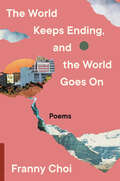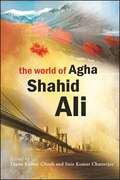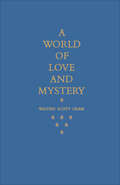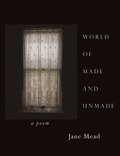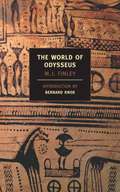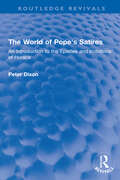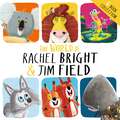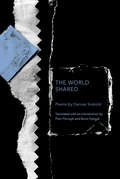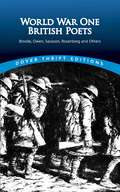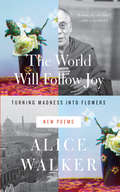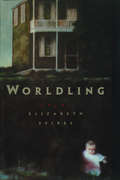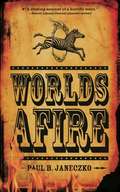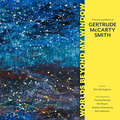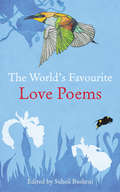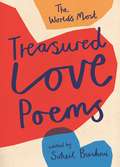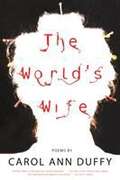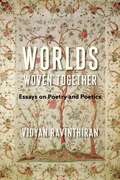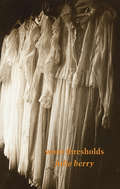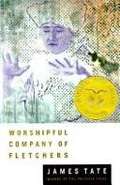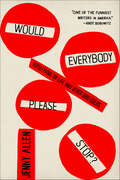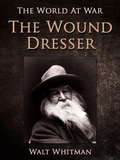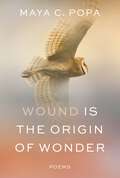- Table View
- List View
The World Keeps Ending, and the World Goes On
by Franny ChoiNamed A Most Anticipated Book by: LitHub * Vulture * Time * A PW 2022 Holiday Gift Pick From acclaimed poet Franny Choi comes a poetry collection for the ends of worlds—past, present, and future. Choi’s third book features poems about historical and impending apocalypses, alongside musings on our responsibilities to each other and visions for our collective survival.Many have called our time dystopian. But The World Keeps Ending, and the World Goes On reminds us that apocalypse has already come in myriad ways for marginalized peoples.With lyric and tonal dexterity, these poems spin backwards and forwards in time--from Korean comfort women during World War II, to the precipice of climate crisis, to children wandering a museum in the future. These poems explore narrative distances and queer linearity, investigating on microscopic scales before soaring towards the universal. As she wrestles with the daily griefs and distances of this apocalyptic world, Choi also imagines what togetherness--between Black and Asian and other marginalized communities, between living organisms, between children of calamity and conquest--could look like. Bringing together Choi's signature speculative imagination with even greater musicality than her previous work, The World Keeps Ending, and the World Goes On ultimately charts new paths toward hope in the aftermaths, and visions for our collective survival.
The World of Agha Shahid Ali
by Tapan Kumar Ghosh; Sisir Kumar ChatterjeeFeaturing essays by American, Indian, and British scholars, this collection offers critical appraisals and personal reflections on the life and work of the transnational poet Agha Shahid Ali (1949–2001). Though sometimes identified as an "Indian writer in English," Shahid came to designate himself as a Kashmiri-American writer in exile in the United States, where he lived for the latter half of his life, publishing seven volumes of poetry and teaching at colleges and universities across the country. Locating Shahid in a diasporic space of exile, the volume traces the poet's transnationalist attempts to bridge East and West and his movement toward a true internationalism. In addition to offering close formal analyses of most of Shahid's poems and poetry collections, the contributors also situate him in relation to both Western and subcontinental poetic forms, particularly the ghazal. Many also offer personal anecdotes that convey the milieu in which the poet lived and wrote, as well as his personal preoccupations. The book concludes with the poet's 1997 interview with Suvir Kaul, which appears in print here for the first time.
A World of Love and Mystery
by Walden Scott CramA World of Love and Mystery is a collection of poetry divided into three parts written by the poet Walden Scott Cram.
World of Made and Unmade
by Jane MeadMead's fifth collection candidly and openly explores the long process that is death. These resonant poems discover what it means to live, die, and come home again. We're drawn in by sorrow and grief, but also the joys of celebrating a long life and how simple it is to find laughter and light in the quietest and darkest of moments.
The World of Odysseus
by M. I. Finley Bernard KnoxThe World of Odysseus is a concise and penetrating account of the society that gave birth to the Iliad and the Odyssey--a book that provides a vivid picture of the Greek Dark Ages, its men and women, works and days, morals and values. Long celebrated as a pathbreaking achievement in the social history of the ancient world, M. I. Finley's brilliant study remains, as classicist Bernard Knox notes in his introduction to this new edition, "as indispensable to the professional as it is accessible to the general reader"--a fundamental companion for students of Homer and Homeric Greece.
The World of Pope's Satires: An Introduction to the Epistles and Imitations of Horace (Routledge Revivals)
by Peter DixonFirst published in 1968, The World of Pope’s Satires is a stimulating and challenging book showing how the satires written by Pope during the 1730s were not only expressions of his own .poetic personality but were also responsive to the habits and attitudes of the age. The author considers Pope’s uses of some current conversational technique (especially that of ‘raillery’) and of the closely related social ideal of the cultivated gentleman. Pope’s regard for certain personal attributes and moral values – notably hospitality, integrity, friendship, charity and self-knowledge – is examined in two ways; as it expresses itself positively in the satires, and as it is defined negatively by his antipathy towards courtly self-seeking and hypocrisy, contemporary manifestations of acquisitiveness, and the pride associated with neo-stoicism. The final chapter is wide ranging and shows that although Pope is at times representative, and therefore limited, in his response to the pressures and uncertainties of the age, his satires live because of the subtlety of his treatment of such Augustan commonplaces as Order and Balance and the passion and spirit of his writing. This will be an interesting read for students of English literature.
The World of Rachel Bright and Jim Field: The Lion Inside and Other Stories: 6 book collection
by Rachel BrightA collection of six stories from the world of Rachel Bright & Jim Field. Meet a brave lion, two squabbling squirrels, a wandering whale and many more incredible animal characters in these best-loved rhyming tales.Featuring: The Lion InsideThe Koala Who CouldThe Squirrels Who SquabbledThe Way Home for WolfThe Whale Who Wanted MoreThe Gecko and the Echo(P) 2022 Hodder & Stoughton Limited
The World Shared (Lannan Translations Selection Series)
by Dariusz SosnickiDariusz Sosnicki's poems open our eyes to the sublime just beneath the surface of the mundane: a train carrying children away from their parents for summer vacation turns into a ravenous monster; a meal at a Chinese restaurant inspires a surreal journey through the zodiac; a malfunctioning printer is a reminder of the ghosts that haunt us no matter where we find ourselves.Among the perpetrators and victims,buzzed or wasted to the bone,gliding without their blinkers onin the ruts of the national fate—they're not at home.Dariusz Sosnicki is an award-winning poet, essayist, and editor in Poland.
World Tapestries: An Anthology of Global Literature
by Globe FearonThis collection of unadapted classic and contemporary literature features the work of authors from various world cultures.
World War One British Poets: Brooke, Owen, Sassoon, Rosenberg and Others (Dover Thrift Editions: Poetry Ser.)
by Candace WardA complex series of treaties, tensions and alliances involving the major and minor European states led to the assassination of Archduke Franz Ferdinand of Austria by Gavrilo Princip, a Serbian nationalist, on June 28, 1914. In response, the armies of Europe were mobilized and by summer's end, the world was at war. But no one could have foreseen the apocolyptic degree of destruction that ensued. By the time the Armistice was signed on November 11,1918, more than nine million military personnel and five million civilians had been killed. In Great Britain and Europe, an entire generation of young men was wiped out. Most of the poets in this anthology participated in what came to be called the Great War; many of them did not survive to see its end. Some, like Rupert Brooke and John McCrae, believed their services were part of a noble and just cause. Others - most notably Siegfried Sassoon and Wilfred Owen - entered the military through a sense of duty, though both poets came to see Britain's participation in the war as unnecessarily prolonged. Antiwar sentiment was not uncommon among soldiers, particularly when it became clear that the war was one of attrition. By September 1914, the Allied and Central Powers were locked into trench warfare, and 1915-1916 were years of stalemate characterized by Pyrrhic victories such as that won by the Allies in Champagne, where 500 yards of ground was gained over the course of two months - at a cost of 50,000 men. Such results contributed to a sense of futility experienced by frontline soldiers, and chlorine gas, first deployed on the Western Front on April 22, 1915 at the Battle of Ypres, intensified the horrors of battle. The initial patriotic fervor that compelled many young men to enlist in the summer of 1914 had, in most cases, by 1916 collapsed into cynicism and anger, as reflected in a saying that circulated among the British troops: "Went to war with Rupert Brooke, came home with Siegfried Sassoon." While not all of the poets contained in this anthology served combat duty, all were touched by the devastation that changed the world's perception of war. Despite the propaganda and intense anti-German sentiment that proliferated during the war, "this was no case," as Edward Thomas wrote, "of petty right or wrong." All of the poetry - whether the manifestation of the poets' despair, outrage or patriotism -- stands as a memorial that has outlasted the battle lines of World War One.
The World Will Follow Joy: Turning Madness into Flowers (New Poems)
by Alice WalkerA poetry collection of &“playful and crooning lyricism&” from the National Book Award– and Pulitzer Prize–winning author of The Color Purple (Booklist). In this dazzling new collection, Alice Walker offers over sixty new poems to incite and nurture contemporary activists. Hailed as a &“lavishly gifted writer,&” Walker imbues her poetry with evocative images, fresh language, anger, forgiveness, and profound wisdom (The New York Times). Casting her eye toward history, politics, and nature, as well as to world figures such as Jimmy Carter, Gloria Steinem, and the Dalai Lama, she &“distills struggles, crises, and tragedies down to bright, singing lessons in living with awareness and joy&” (Booklist). By attentively chronicling the conditions of human life today, Walker shows, as ever, her deep compassion, profound spirituality, and necessary political commitments. The poems in The World Will Follow Joy remind us of our human capacity to come together and take action, even in our troubled political times. &“Her spirituality, concern for human rights, and almost old-fashioned, determined joyousness run deep and her devoted readers will want to follow her as she turns &‘madness into flowers&’&” (Library Journal).
Worldling
by Elizabeth Spires"With not one wrong move, not one word off-key or trivial, this collection of poems makes us experience intimate, yet not necessarily personal, contact with the poet who lets us at times see the struggle behind the refined sensibility. . . .Spires asks the big questions with such competence and polish that we admire her sweating, our metaphysical gladiator, guarantor of our considerable pleasure." --Nancy Nahra, Philadelphia Inquirer Winner of a 1996 Whiting Award. In her fourth collection of poems Elizabeth Spires addresses the elemental subjects of life and of literature: birth, death, creation, and intimations of immortality. The first section focuses on the experiences of conception, pregnancy, and childbirth from the points of view of both mother and child. The second section offers a reversal and reply in which the poems move out into a divided and divisive world. These poems are distinguished by an immaculate lyricism, a pristine sense for the natural world and the rhythms of language.
Worlds Afire
by Paul B. JaneczkoIn this collection of eyewitness poems, the excitement and anticipation of attending the circus on July 6, 1944, in Hartford, Connecticut, turns to horror when a fire engulfs the circus tent, killing nearly 170 people, mostly women and children.
Worlds beyond My Window: The Life and Work of Gertrude McCarty Smith
by Thomas R. Brooks Pat Pinson Stephen Rosenberg Rick WilemonArtist, columnist, and poet Gertrude McCarty Smith (1923–2007) of Collins, Mississippi, carried herself as a demure and proper southern lady, yet this was deceiving as she was a prolific, creative trailblazer who had collectors and dedicated readers from coast to coast, and even in Europe. She grew up during the Great Depression with only some vivid storytelling and pictures from the family Bible to inspire and kindle her artistic spirit. However, at the age of ten, her career launched when her grandmother coaxed her with a box of crayons to milk the family cow—her seventy-year love affair with the arts was born. Over the years, she would express her creativity in many forms, resulting in thousands of paintings, sculptures, songs, poems, and newspaper columns and along the way a variety of artful cakes, as she ran a celebrated twenty-five-year cake business. Her art appeared in all shapes, sizes, materials, and “eatability.” For most of her early career, Gertrude dabbled with a variety of styles—with subjects mostly centered around life in rural Mississippi and her spiritual life. But in 1980 at the age of fifty-seven, she attended her first Mississippi Art Colony at Camp Jacob in Utica, Mississippi. Over the next fifteen years, she would make her pilgrimage twice a year to be inspired by celebrated guest instructors from around the nation and connect with fellow artists. The Colony was a major catalyst, exposing her to new styles, giving her encouragement and freedom to experiment. Gertrude said of the Colony, “I never knew anything about abstract art, but it fascinated me to no end. Abstract art to me is like a beautiful melody without words. In mixed media, I am in another world and often am surprised at the piece that evolves from the torn watercolor papers. The effect is a kaleidoscope of colors that makes the retinas dance.” This book features more than 150 images; a dozen poems; insightful essays from New York art dealer Stephen Rosenberg, acclaimed southern cultural scholar and curator Pat Pinson, and artist, curator, and instructor Rick Wilemon; along with a foreword by Tommy King, president of William Carey University; and a chronicle of her life’s journey by her son-in-law, Thomas R. Brooks. As Rosenberg has said, “Gertrude Smith is a remarkable and authentic American woman who teaches us that talent and creativity combined with a humanistic spirit is both a state of mind and a state of grace—at any age.” Book proceeds will benefit the Gertrude McCarty Smith Foundation for the Arts to bring access and passion for literature, performance, and visual arts to children in underserved communities throughout Mississippi.
The World's Favorite Love Poems
by Suheil BushruiIn this charming anthology, Suheil Bushrui, renowned literature professor, presents an unusually varied collection of the world's favorite love poetry from around the globe and down through the ages.The first compilation to have such wide international coverage, this unique volume contains nearly 200 works from some of the foremost writers in history, including Goethe, Shakespeare, Ibn Arabi, and Rumi, as well as poetry from the indigenous peoples of Africa, Australasia, and the Americas.Beautifully packaged in hardback, this delightful collection of English and translated verse is perfect for any lover of poetry, and will make a unique gift for someone special.
The World's Favorite Love Poems
by Suheil BushruiIn this delightful volume of love poetry, renowned literature professor Suheil Bushrui presents nearly two hundred cherished works from around the world and down through the ages. Here, traditional classics from Shakespeare to Rossetti are thrown into new light beside the poetry of Eastern writers such as Ibn Arabi and Rumi, while little-known poems from the indigenous peoples of Africa, Australasia, and the Americas offer passages that are both moving and profound. Exploring the many facets of love - desire, devotion, delirium, joy, and sorrow - this uniquely diverse collection reminds us of the bonds we all share through the universal experience of love. Without poetry love is wordless. "Stand still and I will read to thee" (Donne).
The World's Favorite Love Poems
by Suheil BushruiIn this charming anthology, Suheil Bushrui, renowned literature professor, presents an unusually varied collection of the world's favorite love poetry from around the globe and down through the ages.The first compilation to have such wide international coverage, this unique volume contains nearly 200 works from some of the foremost writers in history, including Goethe, Shakespeare, Ibn Arabi, and Rumi, as well as poetry from the indigenous peoples of Africa, Australasia, and the Americas.Beautifully packaged in hardback, this delightful collection of English and translated verse is perfect for any lover of poetry, and will make a unique gift for someone special.
World's Most Treasured Love Poems
by Suheil BushuriThe only truly global collection of love poetry, bringing together the most stunning and inspiring poems from all around the worldThis beautiful collection of love poems gathers together thousands of years of timeless verse from around the world. From Shakespeare to Rossetti, traditional English classics sit alongside the works of Eastern writers such as Ibn 'Arabi and Rumi, as well as lesser known gems from the indigenous peoples of Africa, Australasia, and the Americas. Exploring the many facets of love – desire, devotion, delirium, joy, and sorrow – this uniquely diverse volume offers us wisdom from across the ages and reminds us of the bonds we all share.
The World's Wife: Poems
by Carol Ann DuffyStunningly original and haunting, the voices of Mrs. Midas, Queen Kong, and Frau Freud, to say nothing of the Devil's Wife herself, startle us with their wit, imagination, and incisiveness in this collection of poems written from the perspectives of the wives, sisters, or girlfriend is of famous—and infamous—male personages. Carol Ann Duffy is a master at drawing on myth and history, then subverting them in a vivid and surprising way to create poems that have the pull of the past and the crack of the contemporary.
Worlds Woven Together: Essays on Poetry and Poetics (Literature Now)
by Vidyan RavinthiranWriting about poetry follows models provided either by academic scholarship or literary journalism, each with its pitfalls. The former distances the reader from the poem and effaces the critic’s personality. In literary journalism, the critic is front and center, but the discussion is introductory and prioritizes value judgments. In either case, entrenched practices and patterns of privilege limit one’s perspective. The situation worsens when it comes to minoritized poets and poets from the Global South, where the focus is on restrictive notions of identity: the stylistic innovations of literary works get ousted by prefabricated historical narratives.In Worlds Woven Together, the critic, poet, and scholar Vidyan Ravinthiran searches for alternatives, pursuing close, imaginative readings of a variety of writers. His essays are open-ended, attentive, and curious, unabashedly passionate and subjective yet keenly analytical and investigative. Discussing neglected authors and those well-known in the West, Ravinthiran sees politics as inseparable from literary form and is fascinated by the relation of the creative consciousness to the violences of history. The book features essays on writers including Mir Taqi Mir, Ana Blandiana, A. K. Ramanujan, Marianne Moore, Eunice de Souza, Czeslaw Milosz, Ted Hughes, Rae Armantrout, Arvind Krishna Mehrotra, Galway Kinnell, Dawn Lundy Martin, and Vahni Capildeo. Revealing serendipitous connections—between poems and cultures, between lines of verse and the lives we lead—Worlds Woven Together is for all readers fascinated by the mechanics and politics of poetry.
worn thresholds
by Julie BerryReading Julie Berry's poetry means entering a new poetic space, crossing thresholds of pain and delight at once raw and refined. "like marie d’oignies who buried bloody/ mouthfuls of herself/ in the garden/ i need my poems to be like this," Berry writes in "Touching Ground." "Like this" is finely-turned and constantly surprising, haunting as plainsong, throaty as the blues. Her images are so completely unexpected and yet so thoroughly right that you are left wondering why you never imagined "the minute hand [falling] into the refrigerator and breakfast/ . . . clattering across the lawn/ its spoons and bowls and burning toast." Her eye is keen and quirky; its wide embrace enfolds the highways and cemeteries of southwestern Ontario, flying pianos, her lover's ex-neck, Elizabeth Graves Simcoe, furniture cleaners, suicides and mass strandings. And of course her reader. Here is a poet whose honesty and wry humour loosen the tangles of the heart.
Worshipful Company of Fletchers: Poems
by James TateMasterfully drawing on a variety of voices and characters, James Tate joyfully offers his first book since winning the Pulitzer Prize in 1992 for his "Selected Poems."<P><P> Winner of the 1994 National Book Award for poetry.
Would Everybody Please Stop?: Reflections on Life and Other Bad Ideas
by Jenny AllenFinalist for the Thurber Prize for American Humor"One of the funniest writers in America." That’s what The New Yorker’s Andy Borowitz calls Jenny Allen—and with good reason. In her debut essay collection, the longtime humorist and performer declares no subject too sacred, no boundary impassable.With her eagle eye for the absurd and hilarious, Allen reports from the potholes midway through life’s journey. One moment she’s flirting shamelessly—and unsuccessfully—with a younger man at a wedding; the next she’s stumbling upon X-rated images on her daughter’s computer. She ponders the connection between her ex-husband’s questions about the location of their silverware, and the divorce that came a year later. While undergoing chemotherapy, she experiments with being a “wig person.” And she considers those perplexing questions that we never pause to ask: Why do people say “It is what it is”? What’s the point of fat-free half-and-half ? And haven’t we heard enough about memes?Jenny Allen’s musings range fluidly from the personal to the philosophical. She writes with the familiarity of someone telling a dinner party anecdote, forgoing decorum for candor and comedy. To read Would Everybody Please Stop? is to experience life with imaginative and incisive humor.
The Wound Dresser: A Series Of Letters, Written From The Hospitals In Washington, During The War Of The Rebellion (classic Reprint) (The World At War)
by Walt WhitmanWalt Whitman’s “The Wound-Dresser” is a sixty-five-line free-verse poem in four sections describing the suffering in the Civil War hospitals and the poet’s suffering, faithfulness to duty, and developing compassion as he tended to soldiers’ physical wounds and gave comfort. Published at war’s end, the poem opens with an old veteran speaking, imaginatively suggesting some youths gathered about who have asked him to tell of his most powerful memories. The children request stories of battle glory, but the poet quickly dismisses these as ephemeral. He then narrates a journey through a military hospital such as Whitman experienced in Washington, D.C., during the second half of the war. (Excerpt from Wikipedia)
Wound Is the Origin of Wonder: Poems
by Maya C. Popa“This book is an astonishment. In ravishing, formally exploratory poems, Maya C. Popa wields the lyric like a reparative scalpel, evoking wonder and woundedness in equal measure: ‘It’s plain we didn’t see / the future coming,’ she announces. Searching for a spring that brings renewal, lamenting ‘snow / that vanishes with touch,’ her poems register a unique combination of imperilment and possibility, with imagistic precision one can’t forget: ‘A faint hiss—that is / your own life now, hurrying / from one light to another.’ Wound Is the Origin of Wonder reflects to us our own historical moment with unusual clarity, even as its lyric exploration of psychic and social landscapes stand outside of time. This is a book I will return to.” —Meghan O’Rourke Award-winning poet Maya C. Popa suggests that our restless desires are inseparable from our mortality in this pressing and precise collection. Rooting out profound meaning in language to wrench us from the moorings of the familiar and into the realm of the extraordinary, the volume asks, how do we articulate what’s by definition inarticulable? Where does sight end and imagination begin? Lucid and musically rich, these poems sound an appeal to a dwindling natural world and summon moments from the lives of literary forbearers—John Milton’s visit to Galileo, a vase broken by Marcel Proust—to unveil fresh wonder in the unlikely meetings of the past. Popa dramatizes the difficulties of loving a world that is at once rich with beauty and full of opportunities for grief, and reveals that the natural arc of wonder, from astonishment to reflection, more deeply connects us with our humanity.
